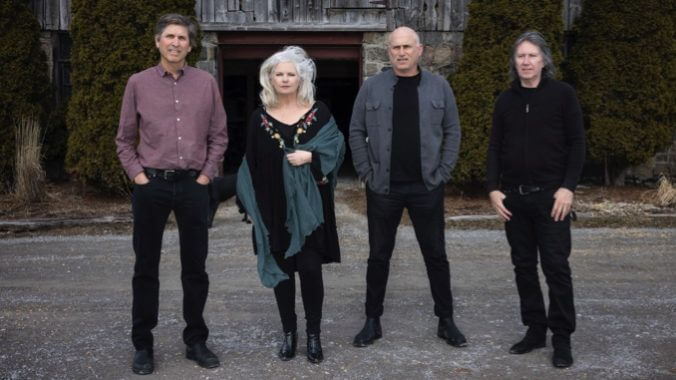Cowboy Junkies on Family, Loss & Such Ferocious Beauty
Photo courtesy of the band
Idle hands, they say, are the devil’s workshop. So during the pandemic, Margo Timmins kept hers in constant motion, banishing Beelzebub in the process. On her farm two miles north of Toronto, the Cowboy Junkies songbird fluttered from task to attention-diverting task, starting with an archival dig through album after album of vintage band photographs, which she organized to soon be transferred to digital. And yes, she says, she even found a backstage snapshot commemorating the band’s first-ever show in San Francisco in the late ’80s, when poker-faced actor Sean Penn dropped by for some quiet conversation afterwards.
“There’s one of us in the basement of Great American Music Hall, and it’s so funny, because both of us are sitting on a bench, and we’ve got two feet between us,” she recalls. “And we’re both looking at each other, and it’s really intense—you can really feel the tension.”
Next, she dug into a treasure trove of dusty old cassette tapes of various cover versions undertaken by the quiescent quartet over the years, long after their signature 1988 take on “Sweet Jane,” which were then redone for their covers for a 2020 Songs of the Revolution release, like The Cure’s “17 Seconds,” “Neil Young’s “Love in Mind,” Bob Dylan’s “I’ve Made Up My Mind,” and the late Gordon Lightfoot’s “The Way I Feel.” “And there were some rare songs we found that I just don’t remember ever singing at all,” she confesses.
The recording began in earnest on Such Ferocious Beauty, Cowboy Junkies’ first album of new material in five years, composed by bandleader and brother Michael Timmins in honor of the recent passing of both parents, under completely different circumstances. And her patented smoke-tendril vocals wreath effortlessly around her sibling’s forlorn, occasionally funereal notes and filigrees, from the opening elegy “What I Lost” to a bluesier “Hard to Build, Easy to Break,” the seraphic “Shadows,” the subtly symphonic “Knives,” and the hushed, optimistic closer “Blue Skies.” It’s quite the heartwarming, mortality-themed familial undertaking (especially with brother Peter Timmins on drums and long time bassist Alan Anton providing eerily syncopated rhythm). But at 62, Margo Timmins still felt restless.
“So I started a decluttering company,” she adds. “I was down in people’s basements and I loved it! It was mindless work, but it made people so happy, because they finally had a clean basement. And that helped a lot to give me purpose.” And, of course, dibs on any collectibles folks were discarding, like valuable cameras, corning-ware, even mint-condition comic books. The only thing she didn’t have to busy herself with was songwriting, she says. “It’s always Michael—I stopped writing a long time ago, because his songwriting is up there on such an amazing level, I could never begin to compete.” And here’s where 64-year old Michael Timmins himself chimes in, to relate the rest of the Ferocious fable.
Paste: Nobody seems to talk about this, but going back to the beginning, your first album, Whites Off Earth Now!!, was actually a thing back then, because every once in a while authorities would find these radicals up in the Pacific Northwest who’d assumed that name, and were working on some 12 Monkeys-deadly virus to get, not just whites, but everyone off the Earth now. But now I can’t find any proof that they ever existed. But why would you dub your debut disc that?
Michael Timmins: Yeah! And you have to remember, this was way before the internet, so you had a real lack of information. But we knew there was a group with that slogan or name, Whites Off Earth Now, and we didn’t know anything about it, what they meant or symbolized. But we just loved the idea, because it was such a great picky little statement, because we were just a bunch of white kids playing blues again, so once again suburban white kids were taking this great old Black roots music and pretending to make it their own. So it was sort of a dig at ourselves—it wasn’t necessarily a nod to the organization. We just stole the name, and their slogan. And I’ve done the same as you, you know? Because I’m curious, and I remember coming across this article and loving their name and their slogan, and it was way before Cowboy Junkies were even around, so we had carried it with us. But in recent years, I tried to find them, like, “What was that? Who were those people?” And I can’t find it, either! It’s really interesting, eh?
Paste: And I really hate to say this, but as we teeter on the precipice of extinction, getting closer every day, I’ve noticed that in many superhero films, like Kingsmen and The Watchmen, the super villains have had pretty good ideas, like killer cellphones and a frightened-rabbit nuclear standoff between all countries, worried that Dr. Manhattan will nuke them all.
Timmins: Yeah. Exactly. And it’s hard to judge it, especially if you put it in an historical context, you know? Is what’s going on now worse than what was going on in the 1940s? I don’t think so. But it’s happening to us, and it’s happening now, so obviously it feels like everything’s falling apart. But when you start to go back through history, and think of the plagues that have devastated humanity, we’re not even close, and we’re still in pretty good shape. But we’re trying hard, trying hard to wreck it.
Paste: Going from that to fatherhood, how are your kids doing?
-

-

-

-

-

-

-

-

-

-

-

-

-

-

-

-

-

-

-

-

-

-

-

-

-

-

-

-

-

-

-

-

-

-

-

-

-

-

-

-








































